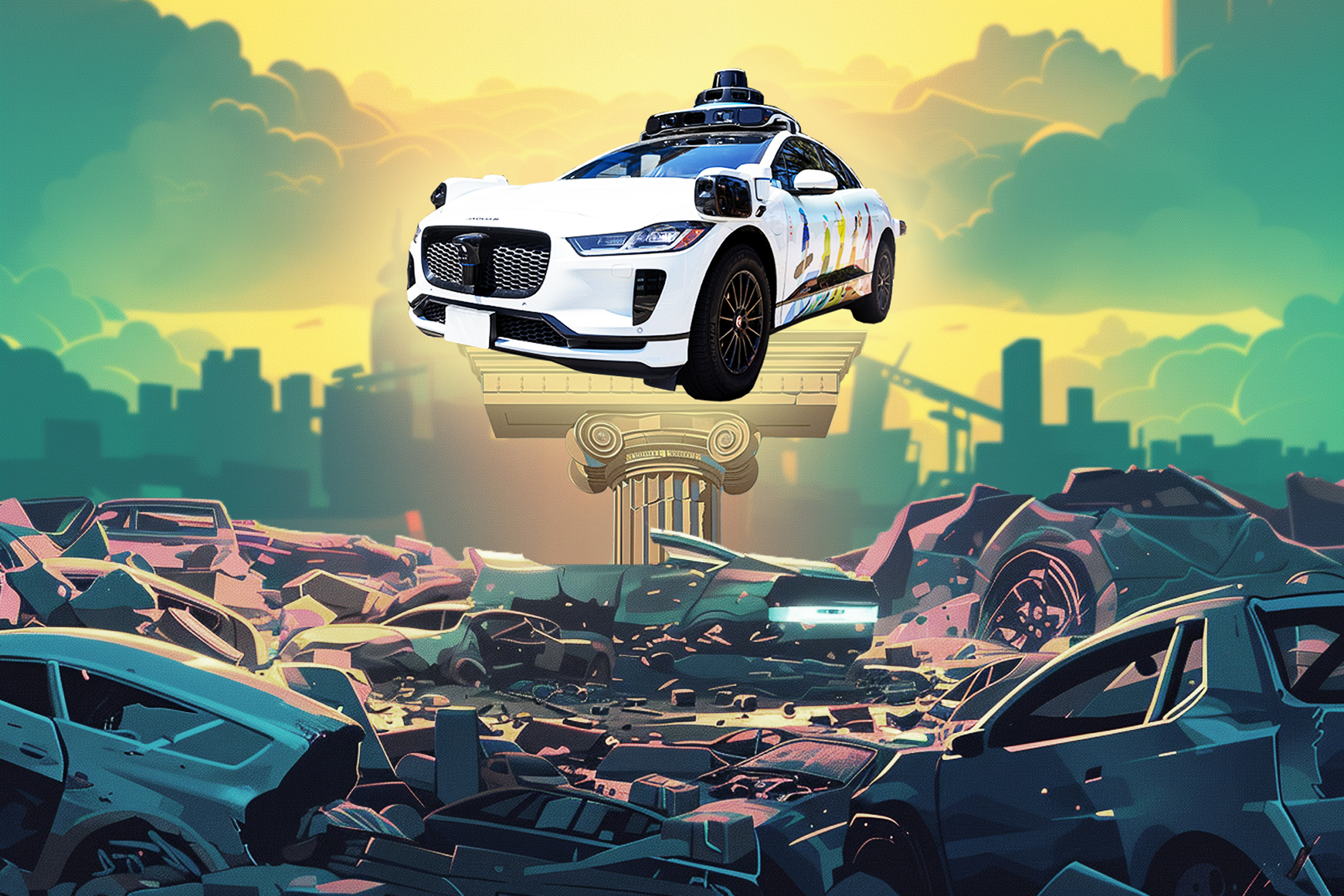I ride in Waymo robotaxis almost daily in my hometown of Phoenix. My 5-year-old loves them, and so do I. Waymos are immaculate, reliable, comfortable, cost the same or less than ride-hails and feel safer than the average cab. As a cyclist, I’d rather be surrounded by Waymos than human drivers.
So you can imagine my reaction to the San Francisco mob that torched an empty Waymo last month. Some claimed this vandalism was justified as part of a larger anti-autonomous vehicle movement. One tech critic even called it a “beautiful scene.”
I waited for someone to step in and defend Waymo—the only autonomous vehicle company that has successfully deployed driverless robotaxis anywhere. But all I found were venture capital bros on X complaining about Luddites, then Mayor London Breed waving the incident away by writing that there was “no message or intent attached.”
Two days later, an activist group calling itself Network for Safety in Our Streets and for Working People demanded that Gov. Gavin Newsom remove all Waymos from the streets. Then the California Public Utilities Commission suspended Waymo’s request to expand service in San Mateo and LA counties (a decision it would soon reverse).
I’d like to say one side of the debate over autonomous vehicles in cities is right and the other side is completely wrong. But like most debates in modern America, the loudest voices on each side are equally guilty of stripping away any nuance from a debate worth having. The main difference in the autonomous vehicle debate is that tech pessimists don’t appear to understand how the technology works and tech optimists won’t admit when it doesn’t.
The fundamental problem with such a “debate” is that there is no monolithic autonomous vehicle industry to attack or defend. There are many companies working on self-driving cars, with differing hardware, software, business models, safety protocols and timelines. Like any industry, there are good actors and bad actors all duking it out for dominance.
Yet autonomous vehicle opponents insist on smearing all of these companies together.
Let’s deconstruct the two primary reasons the Network for Safety cites for San Francisco residents’ “growing anger and disgust” with autonomous vehicles:
Lie #1: Waymos aren’t safe.
I’ve worked in the industry for six years (never for Waymo) and most competitors will tell you Waymo is a good actor, the best among a large but dwindling group of companies working on self-driving tech. None of the most infamous tragedies associated with autonomous vehicles—the 2016 death of Joshua Brown in a Tesla, the 2018 death of Elaine Herzberg, who was struck by an Uber test vehicle and the 2023 dragging of a pedestrian by a Cruise vehicle—involved Waymo.
Good-faith critics will always want more data, but 15 years after Waymo’s inception, it is indisputable that the company has had the longest, most pragmatic, cautious and patient path to commercialization of anyone in the industry.
Yes, Waymo has had several minor incidents, but that’s to be expected as fleet size and driven miles grow. More importantly, the company has been more generous with its safety research than any other autonomous vehicle company. Even industry critic Philip Koopman has acknowledged that Waymo’s safety record appears equivalent to and potentially superior to the average Uber driver. This indicates the vast strides Waymo has quietly and demonstrably made over time.
Lie #2: Waymos will kill jobs.
Fear of job loss to automation has been around for so long that the Pessimists Archive has documented a century’s worth of stories predicting it. History has proven that for every new technology that changes or eliminates jobs, new ones are created. But the fear of job loss wasn’t invented whole cloth by tech pessimists; it has been fueled by absurd promises of rapid autonomous vehicle deployment. Analyst Eric Paul Dennis has been tracking these broken promises for years, and it’s really something. Guess who actually kept its word? Waymo, further proving its good actor status.
Meanwhile, how many ride-hail jobs has Waymo eliminated? Zero. So far, it has created several thousand jobs, and as it scales, it will need to hire thousands more.
AVs need smarter critics
If the autonomous vehicle industry is ever to be regulated wisely, it needs smarter critics. If the industry is to grow safely and responsibly, it needs better defenders.
There is an enormous safety, culture and technology gap between good actors like Waymo and those like Cruise, whose recent flame-out was easily foreseen by the handful of people at rival companies doing serious competitive analysis.
The techno-optimists know the differences between the companies, but knowingly pretend they don’t exist as they bleat about technology saving lives. Why? Because it’s a small world of founders and investors, and no one wants to rock the boat, admit they picked the wrong horse, or get cut out of the next deal.
Autonomous vehicle technology is inevitable. The only questions are who will survive to commercialize it at scale, how long that will take and when the safety and economic gains will crystalize. In that debate, communities win when the good actors do. There is still time to prevent a fourth seminal tragedy in autonomous vehicle history.
The good news? As I was writing this, the utilities commission reversed course and granted Waymo permission to expand in San Mateo and LA counties, while Cruise remains unable to deploy in California at all. Sometimes, the government gets it.
Now, if you’ll excuse me, I’m going to go pick up my 5-year-old daughter from a friend’s house. In a Waymo. She prefers it to riding home in my Tesla.
Alex Roy is the co-founder of Johnson & Roy Advisors, the Autonocast podcast, The Drive, and the Human Driving Association. He was previously director of special operations at Argo AI. He has never been employed by or advised Waymo or Cruise.
